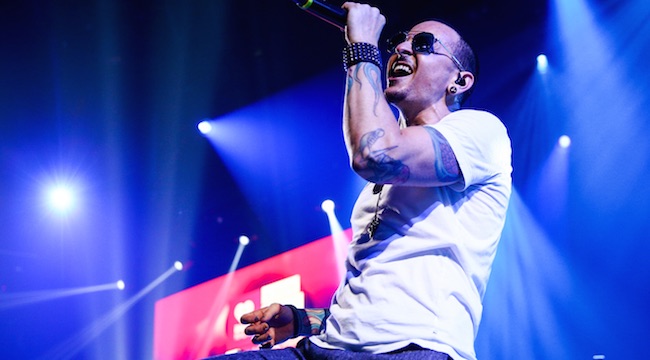
Following the news of Linkin Park frontman Chester Bennington’s tragic decision to end his own life yesterday, there has been an outpouring of grief and shock from the music community, his fans, and even his bandmates. Bennington was already pretty clearly reeling over the loss of his own close friend, Chris Cornell, and even sang at Cornell’s funeral a couple months ago. That footage is now even more heartbreaking to watch. His legacy remains unparalleled in our current era of rock, and his contributions to hip-hop as a benefactor are also innumerable.
The UK tabloid The Mirror has obtained excerpts from one of the final interviews that he gave with journalist Will Lavin back in May.
“I came to a point in my life where I was like, ‘I can either just give up and f*cking die or I can f*cking fight for what I want,’” Bennington said. “And I chose to fight for what I wanted. I wanted to have good relationships. I wanted to love the people in my life. I wanted to enjoy my job. I wanted to enjoy being a dad and having friends and just getting up in the morning. Because that was a struggle for me.”
Speaking on the band’s new record, Bennington said he’s been struggling with trying to control everything, and letting everything happen naturally.
“It’s hard. You know? Instinctively I want to make the river flow where I want it to flow and I want to make the water be calm when I want it to be calm,” he said. “It takes a lot of patience to just let things happen as they’re happening and just ride it out. And I feel like that’s where I’m at in life right now. I’m just going to focus on what’s going on right now and make the best of the situation no matter what it is. I’m not going to question it or analyze it in any way because that’s me going back to my old behavior where I was trying to control everything.”
He called their latest album the therapeutic and personal:
“One More Light is for us a very personal and very therapeutic kind of record. We got into a lot of aspects of our lives that we probably wouldn’t have normally shared with anyone and just dealt with it on our own. We brought in various issues and situations into the writing process. When you hear it in the context of the music there’s a hopefulness and there’s a sense of moving forward and moving on and that’s really where we’re coming from.”
And that it came out of one of the darkest times of his life:
“For me personally when we first started working on this record I was coming out of the darkest time of my life and it was all sh*t that I was doing to myself. It was all stuff that I had control over but even though I felt differently at the time. I felt like the world was full of sh*t and everybody I knew was full of sh*t and life sucks and I was like ‘F*ck it.’ All that stuff it was just internal.”
He further said making the record was one of the things that helped him, during this time, to battle his demons.
“It was all really things I could work on if I chose to, and make myself happy. You know? Make myself capable of dealing with life on life’s terms, like it’s not always going to be peaches and cream but it doesn’t always have to suck when it’s not. For me it took a lot of work. It actually took me opening up and talking to my friends about it and writing about it, and like going to therapy and battling my demons.”
Bennington was married twice, and is survived by six children. Read our tribute to his legacy here.






